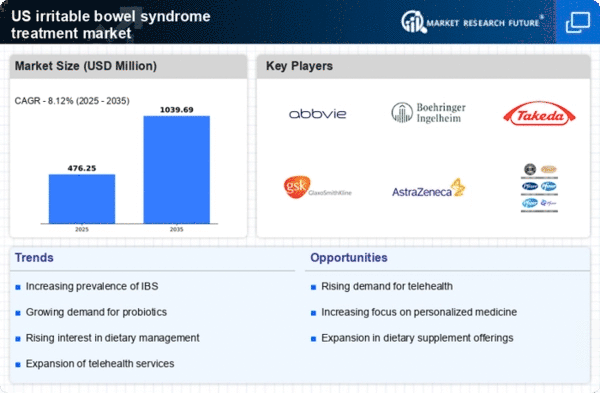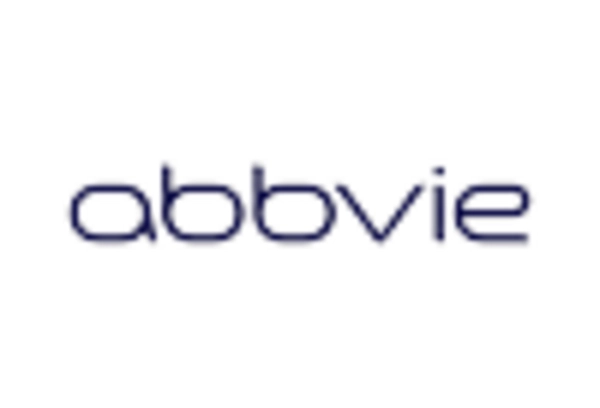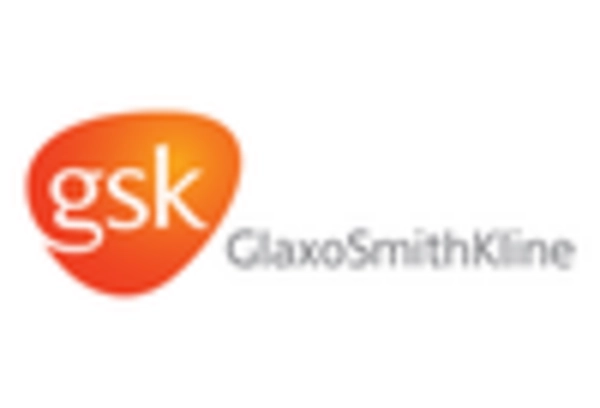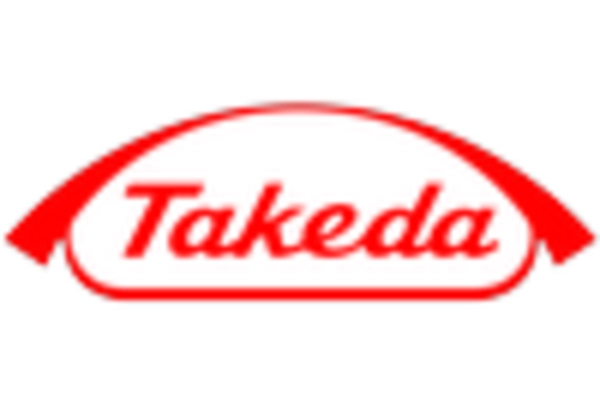Growing Prevalence of IBS
The rising incidence of irritable bowel syndrome (IBS) in the US is a primary driver for the irritable bowel-syndrome-treatment market. Recent estimates suggest that approximately 10-15% of the US population experiences IBS symptoms, leading to increased demand for effective treatment options. This growing prevalence is attributed to various factors, including dietary habits, stress levels, and genetic predispositions. As awareness of IBS increases, more individuals seek medical advice, thereby expanding the patient base for treatment providers. Consequently, pharmaceutical companies and healthcare providers are likely to invest in research and development to create innovative therapies tailored to the needs of this expanding demographic. The increasing recognition of IBS as a significant health concern further propels the market forward, as healthcare systems strive to address the needs of affected individuals.
Rising Healthcare Expenditure
The upward trend in healthcare expenditure in the US is a significant driver for the irritable bowel-syndrome-treatment market. As healthcare spending continues to rise, patients are more likely to seek medical attention for IBS symptoms, leading to increased demand for treatment options. According to recent data, healthcare expenditure in the US is projected to reach approximately $4 trillion by 2025, reflecting a growing willingness to invest in health-related services. This financial commitment enables healthcare providers to offer a wider range of treatment modalities, including advanced pharmaceuticals and integrative therapies. Consequently, the irritable bowel-syndrome-treatment market is poised for growth as patients gain access to improved care and innovative treatment solutions.
Increased Awareness and Education
The heightened awareness and education surrounding irritable bowel syndrome (IBS) are pivotal drivers for the irritable bowel-syndrome-treatment market. Campaigns aimed at educating both healthcare professionals and the general public about IBS symptoms and management options have gained momentum. This increased awareness encourages individuals to seek medical help, thereby expanding the patient population requiring treatment. Moreover, educational initiatives often emphasize the importance of early diagnosis and intervention, which can lead to better health outcomes. As more people become informed about IBS, the demand for effective treatment solutions is likely to rise. This trend not only benefits patients but also stimulates growth within the market as healthcare providers respond to the increasing need for specialized IBS treatments.
Advancements in Treatment Modalities
Innovations in treatment modalities are significantly influencing the irritable bowel-syndrome-treatment market. Recent developments in pharmacological therapies, including the introduction of new medications specifically targeting IBS symptoms, have enhanced treatment options available to patients. For instance, medications such as linaclotide and lubiprostone have gained traction due to their efficacy in alleviating symptoms. Furthermore, the integration of behavioral therapies and dietary modifications into treatment plans has shown promise in improving patient outcomes. As healthcare providers increasingly adopt a multidisciplinary approach to IBS management, the market is likely to witness a surge in demand for diverse treatment options. This trend indicates a shift towards more comprehensive care strategies, which may ultimately lead to improved quality of life for patients suffering from IBS.
Regulatory Support for New Treatments
Regulatory support for the development and approval of new treatments is a crucial driver for the irritable bowel-syndrome-treatment market. The US Food and Drug Administration (FDA) has implemented streamlined processes for the review of medications targeting IBS, which encourages pharmaceutical companies to invest in research and development. This regulatory environment fosters innovation, allowing for the introduction of novel therapies that address the diverse needs of IBS patients. As new treatments receive approval, the market is likely to expand, providing patients with more options for managing their symptoms. Furthermore, regulatory incentives for orphan drugs and therapies targeting specific IBS subtypes may further stimulate market growth, as companies are motivated to develop specialized solutions.

















